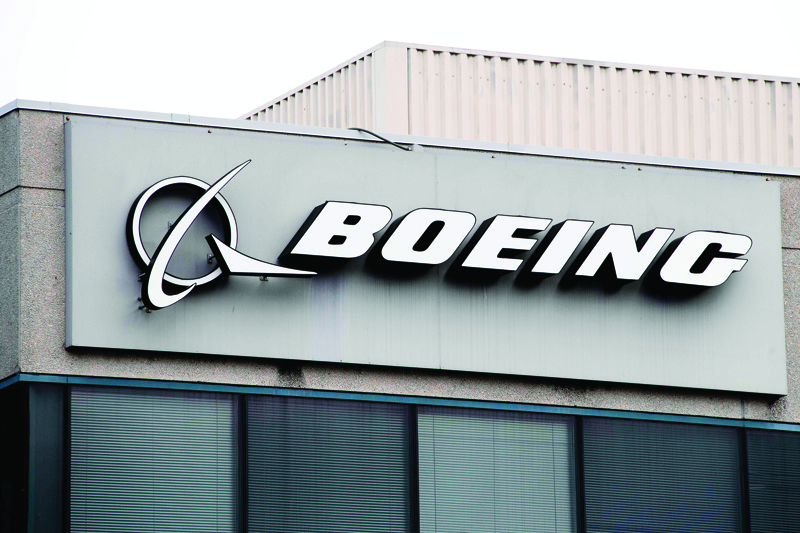
NEW YORK: Congressional investigators blamed two deadly Boeing 737 MAX crashes on "repeated and serious failures" by the company and air safety officials, according to a report released Wednesday that called for an overhaul of the US aviation regulatory system. "The MAX crashes were not the result of a singular failure, technical mistake or mismanaged event," said the report, which blasted both Boeing and the Federal Aviation Administration. "They were the horrific culmination of a series of faulty technical assumptions by Boeing's engineers, a lack of transparency on the part of Boeing's management, and grossly insufficient oversight by the FAA."
The 239-page report released by congressional Democrats is the culmination of an 18-month probe by the House Transportation and Infrastructure Committee into crashes of Lion Air and Ethiopian Airlines planes that together claimed 346 lives. The latest in a series of withering reviews of the crashes, the document adds to scrutiny of both Boeing and the FAA as the agency manages the process of requiring upgrades to the plane before it is cleared to fly again. The MAX has been grounded since March 2019.
It is "clear that at Boeing, safety comes after cost-cutting, profit maximization and share price pumpage," said Paul Njoroge, who lost his entire family on the Ethiopian Airlines crash. "The ungrounding process of the 737 MAX planes should be halted until the FAA recaptures its authority over Boeing." The report flagged numerous failings, including pressure within Boeing to rush the MAX out in order to compete with an Airbus plane, a "culture of concealment" in which the plane maker withheld key information from regulators, and undue influence by the company on FAA higher-ups, which marred oversight.
Much of the analysis centers on the Maneuvering Characteristics Augmentation System (MCAS), an anti-stall system that has been seen as a central factor in both crashes because it activated improperly and repeatedly pointed the jets downward, preventing pilots from regaining control of the planes. The system suffered from "faulty design," and Boeing downplayed the importance of the system by failing to classify MCAS as a "safety-critical" mechanism that would have triggered tighter oversight. The Chicago-based company also concealed crucial information about the system, not even alerting pilots to its existence, the report said.
Regulatory overhaul ahead?
The report, overseen by committee chairman Peter DeFazio, a Democratic representative from Oregon, called for an overhaul of the US regulatory system. "Both Boeing and the FAA have suggested that the certification of the 737 MAX was compliant with FAA regulations," the report said. "The fact that a compliant airplane suffered from two deadly crashes in less than five months is clear evidence that the current regulatory system is fundamentally flawed and needs to be repaired."
But Republicans on the committee rejected that appraisal, pointing to changes already implemented "with more to come," said a statement from Reps Sam Graves of Missouri and Garret Graves of Louisiana, the senior Republicans on the committee and aviation panel. None of the reports and investigations "have concluded that the US certification system is fundamentally broken or in need of wholesale reform," they said.
A move to beef up the FAA's authority and budget would be a major shift from the anti-regulatory impulse in Washington in recent decades, said Richard Aboulafia, aviation expert at Teal Group, a research firm specializing in aviation and defense "The mantra has been starve the beast and don't give regulators what they need," Aboulafia said. "The report captures a great deal of what people are thinking. It doesn't necessarily create next steps."
MAX still grounded
DeFazio has chaired a series of hearings on the MAX, including one last October with former chief executive Dennis Muilenburg, who was ousted two months later and replaced by David Calhoun. Boeing said it has upgraded its processes after the crashes, setting up a new safety organization and restructuring its engineering operations to elevate concerns about safety to senior management.
"Once the FAA and other regulators have determined the MAX can safely return to service, it will be one of the most thoroughly scrutinized aircraft in history and we have full confidence in its safety," Boeing said. An FAA spokesman said the agency "is committed to continually advancing aviation safety and looks forward to working with the Committee to implement improvements identified in its report." Shares of Boeing rose 2.4 percent to $167.46.- AFP










